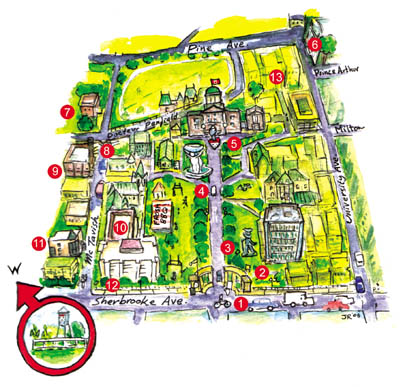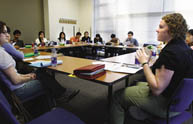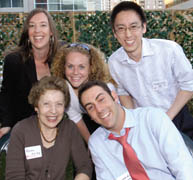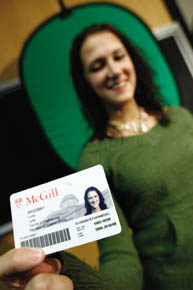Survive and thrive: A visual guide to your first week at McGill
Survive and thrive: A visual guide to your first week at McGill McGill University
User Tools (skip):
Survive and Thrive
A visual guide to your first week at McGill

Jack Ruttan
1. Roddick Gates. Welcome to McGill! The Roddick Gates mark the main entrance to the university's downtown campus. They were erected in 1925 in memory of Thomas Roddick, former Dean of the Faculty of Medicine. The grey limestone is a signature McGill colour — you'll find it in many of the lower campus buildings.

Orientation centre coordinator Chelsea Clogg (U2 Law) talks to volunteers.
Owen Egan
2. The Welcome Centre. Misplaced your McGill information pamphlets during your move to Montreal? Restock at the Welcome Centre, where you'll find everything you need to know about becoming a McGill student. From Aug. 28 to Sept. 1, the Welcome Centre offers regular student tours as part of its Orientation Week. To register, visit the McGill in Mind website at https://mcgillinmind.mcgill.ca.
The Welcome Centre is located on the main floor of Burnside Hall, 805 Sherbrooke Street West. For more information, call 514-398-6555 or email welcome@mcgill.ca.
3. James McGill Sculpture. Before he died, James McGill, a Scottish fur merchant and Montreal magistrate, donated his 46-acre estate and £10,000 to the Royal Institution for the Advancement of Learning to found a university. These days, the intellectual visionary can be seen donning a McGill cap and smiling for the camera as part of frosh photo scavenger hunts.
4. The Three Bares. When this fountain sculpture was first given to the university, some worried it might taint the purity of McGill's students. Since then, however, the campus landmark has been a fixture in convocation photos, fundraising events and the annual student-run Open Air Pub.
5. Arts Building. Nothing symbolizes McGill like the Greek-style portico and Doric columns of the Arts Building. Despite countless changes to its interior, the Arts Building has retained its original outer walls — an architectural custom called façadism. What few campus goers know is that this legacy building stands on land once part of the oldest living democracy on earth: the Mohawk people. Learn more about McGill's Aboriginal heritage and partnerships by visiting the First Peoples' House at 3505 Peel Street or www.mcgill.ca/fph.

Phillip Chin
Back: Brandi Sunby (BA'04), Heather Bradfield (BA '99), Marshall Wong (BA '00); Front: Sondra Schloss (BA '53) and Lorenzo Pederzani (BA '99) at the Vancouver Summer Send Off, August 17. McGill alumni organize Send Off events worldwide, to give incoming students the chance to ask about McGill. (Edited for accuracy)
6. Residence Admissions Office. So you've swapped your family for the 2,200 freshmen that make up McGill's residence population. What now? Learn about meal plans, floor fellows, residence councils and much more at the Residence Admissions Office. You'll find a room to call your own whether it's in Upper Rez, Royal Victoria College, New Residence Hall, Solin Hall or a MORE House. Just be sure to guard your quarters with your life: you're paying for laundry now!
The Residence Admissions Office is located at 3641 University Street. For more information, visit www.mcgill.ca/residences.
7. Thomson House. Thomson House is the social hot spot for graduate students at McGill (sorry, freshmen, no undergrads allowed). Since 1968, this elegant building has served as a restaurant, bar and meeting place for the Post-Graduate Students' Society of McGill University (PGSS). By day, grad students can be found in the lounges surfing free wireless internet; by night, these same students kick up their heels at the many events hosted by PGSS.
Thomson House is located at 3650 McTavish Street. For more information, call 514-398-3756, email info.pgss@mail.mcgill.ca or visit www.pgss.mcgill.ca.
8. First Year Office. Feeling overwhelmed? The First Year Office (FYO) is your one-stop destination for all freshmen queries. Whether you're wondering about residences, exams or the best place for poutine, the friendly, knowledgeable and bilingual FYO staff will help point you in the right direction. And with Student Health Services, the International Students' Lounge and the Career and Placement Service all in the same building, chances are the answer to your question is just around the corner.
Itching to get involved in student life? Don't miss the Discover McGill Student Life Street Fest following the Discover McGill Welcome Day on August 30. McTavish Street will be devoted to student information tables, interactive activities, a BBQ and a live performance by Kalmunity.
The First Year Office is located in the Brown Student Services Building, 3600 McTavish Street, Suite 2100. For more information, call 514-398-6913 or visit www.firstyear.mcgill.ca/essentials.
9. Student Union Centre. Affectionately referred to as the "William Shatner Building" (yes, Captain Kirk graduated from McGill), the Student Union Centre is home to a cafeteria, a student lounge, a ballroom, a theatre, a campus bar, a computer store, a travel agency and the offices of dozens of student clubs and services. Discover the endless ways you can get involved in student life at Activities Night on Sept. 15. And be sure to drop by the Students' Society Office to pick up your free copy of the Student Handbook, the unofficial authority on all things freshman.
The Student Union Centre is located at 3480 McTavish Street. For more information, visit www.ssmu.mcgill.ca or drop by the SSMU General Offices, open 9:00 am to 5:00 pm, Monday to Friday.
10. Library. Once freshman fever has dwindled, you will have to appeal to minds greater than your own to prepare for exams and write essays. With 3,568,651 books in 13 branches, the McGill Libraries are your best bet for quality research and a quiet study space. The McLennan/Redpath Library buildings offer a 24-hour study room, a basement cafeteria and a Rare Books and Special Collections Division displaying everything from Napoleonic prints to Montreal maps. Plus, savvy librarians host regular workshops on e-journals and databases to ensure your web research skills are up to scratch.
The McLennan Library Building is located at 3459 McTavish Street. For more information about McGill's 13 library branches, visit www.mcgill.ca/library.

Decked out in the latest McGill garb, Eric Lindenbaum (U3 Arts student and bookstore employee), right, poses with University Relations Office employees Mike Murphy and Catherine Paquette. The fashions are selected annually by bookstore clothing buyer, Lawrence Marzette, who boasts,"McGill students are very fashion conscious," and welcomes the challenge of staying on top of the latest trends. New items this year include women's urban camouflage tees, and sueded peach and fleece sweatshirts.
Owen Egan
11. Bookstore. The McGill University Bookstore offers more than 50,000 square feet of books, course packs, office supplies and McGill merchandise. Grab a coffee at the Bookstore Café for a well-deserved study break, or get your finicky laptop fixed at the McGill Computer Store. Freshmen beware: every semester begins with a book-buying rat race so take advantage of the store's Back-to-School hours (Monday to Friday, 9:00 am to 8:00 pm; Saturday, 10:00 am to 5:00 pm) to beat line-ups.
The McGill University Bookstore is located at 3420 McTavish Street. For more information, visit www.mcgill.ca/bookstore or call 514-398-7444.
12. Macdonald Campus. Located in beautiful Ste. Anne de Bellevue, Macdonald Campus houses the Faculty of Agricultural and Environmental Studies. This waterfront campus boasts stunning nature conservation centres like the Morgan Arboretum and the Molson Reserve. Daytime attractions include hiking, bicycling and horseback riding! Students living downtown can catch a ride to Macdonald on the inter-campus shuttle service. If you are a registered Macdonald student, you can get your ID card by appointment during the Mac Orientation week.
Macdonald Campus is located in Ste. Anne de Bellevue at the West end of the Island of Montreal. For more information, visit the Students' Society website at www.macdonald.mcgill.ca/mcss or call the Student Affairs Office at 514-398-7925.

Lydia Lortie (U1 Architecture) proudly displays her new ID.
13. ID Centre. Already a registered student? Make sure you have proof! Your McGill Student ID card allows you to borrow library books, get residence food and write exams. Keep it on you when you're off campus for discounts on everything from bus fare to grocery delivery.
Get your ID card, before classes start, in the Trottier Building cafeteria, August 21 to Sept. 1 from 9:00 am to 5:00 pm. This year, the revamped ID Centre brings together a bunch of services to make your first days at McGill simpler. On a meal plan? Get your ID card stamped by McGill Food Services on the spot. Live off-campus? Get proof of registration to buy your discounted metro pass.
The ID Centre is operating out of the Trottier Building cafeteria at 3630 University Street until Sept. 1. After Sept. 5, get your student card at the Admissions, Recruitment and Registrar's Service Centre in the James Administration Building, Room 205. The centre is open Monday to Thursday from 9:00 am to 5:00 pm and Fridays from 10:00 am to 5:00 pm.
For new professors
First-year students aren't the only rookies on campus. All new professors are invited to the faculty orientation session on August 29, where they'll get a refresher course on the workings of the university.
And every one of McGill's teachers can take advantage of the teaching support team at the newly relocated Teaching and Learning Services (formerly known as the Centre for University Teaching and Learning). TLS is now in the McLennan Library, Room MS-12. The team will help you brush up on how to keep the hordes attentive and receptive. Go to www.mcgill.ca/tls or call 514-398-6648.
Also, profs are invited to enter their coordinates into McGill's database, the Media Guide to McGill Experts at www.mgill.ca/newsroom/mediaguide.
This listing of over 700 McGill faculty is a journalist's guide to McGill scholars who can offer expert commentary or background on issues in the news. To include yourself in the guide, simply go to www.mcgill.ca/uro-survey. Sign in (top left hand corner) using your Minerva ID and password, complete and submit the form. The information will be uploaded in a day or so. If you have any questions, please call Tara Shaughnessy 514-398-6753 or email tara.shaughnessy@mcgill.ca or mediaguide.avp@mcgill.ca.
Search
Search (skip):
Milestone Mania
Founded in 1821, McGill is one of Canada’s oldest English universities and, as such, is rife with history. Here is a timeline of milestone dates in McGill’s past that will be feted over the course of the coming academic year:
150 years
Both the Faculty of Education and the Graduate Society (which would later
become the Alumni Association) were formed in 1857.
125 years
The Douglas Hospital was founded in 1881 under the pre-political
correctness name "Protestant Hospital for the Insane."
100 years
Macdonald college is incorporated and begins admitting students in
1906-07.
The first university-level management courses are offered at McGill in
1906, these courses eventually evolve into the School of Commerce in 1920
and the Desautels Faculty of Management in 1968.
At the request of the provincial government, McGill helps establish the
satellite McGill University College of British Columbia (MUCBC) in 1906.
MUCBC later becomes UBC. Yeah, you’re welcome.
85 years
The McCord Museum opens its doors following the donation of 15,000 objects
from the personal collection of David Ross McCord.
If there are any other milestones that we’ve overlooked, please feel free to contact us by email.

